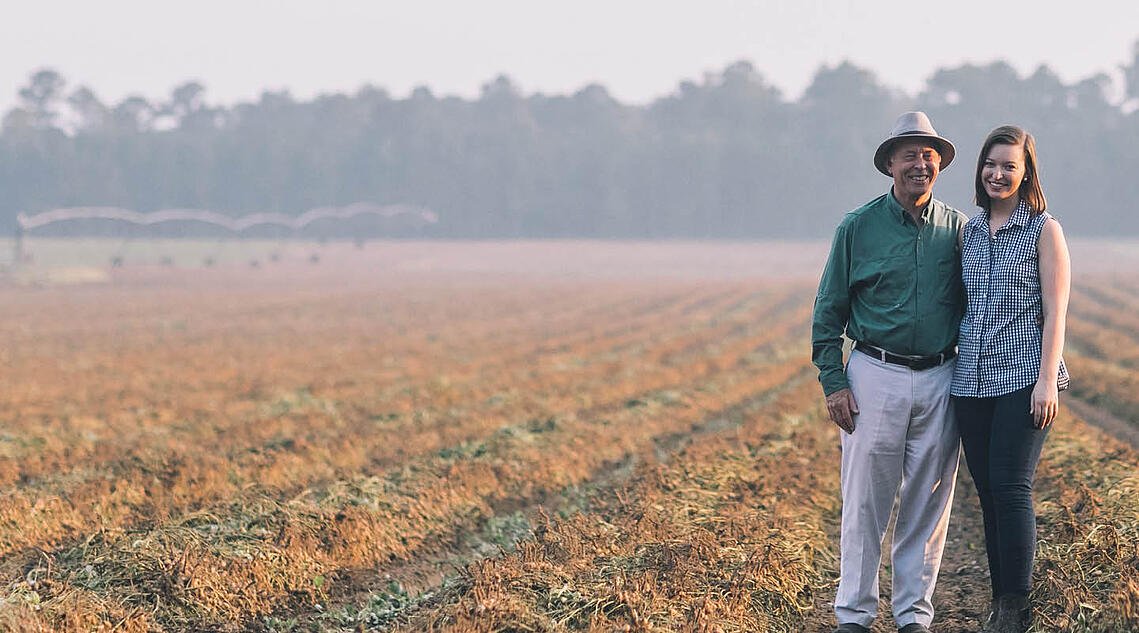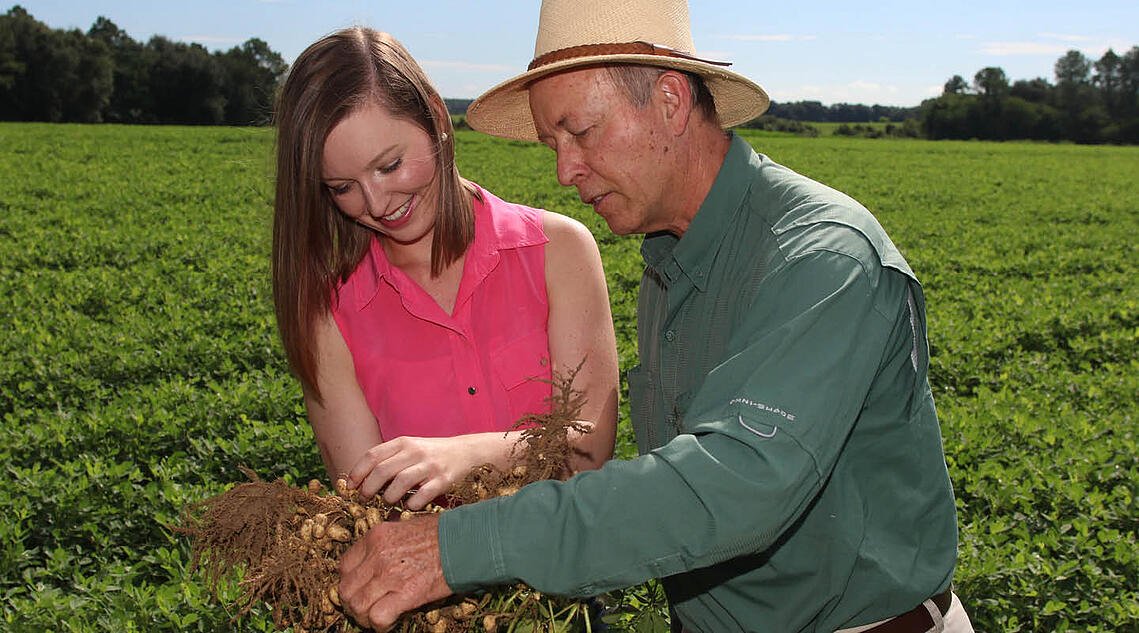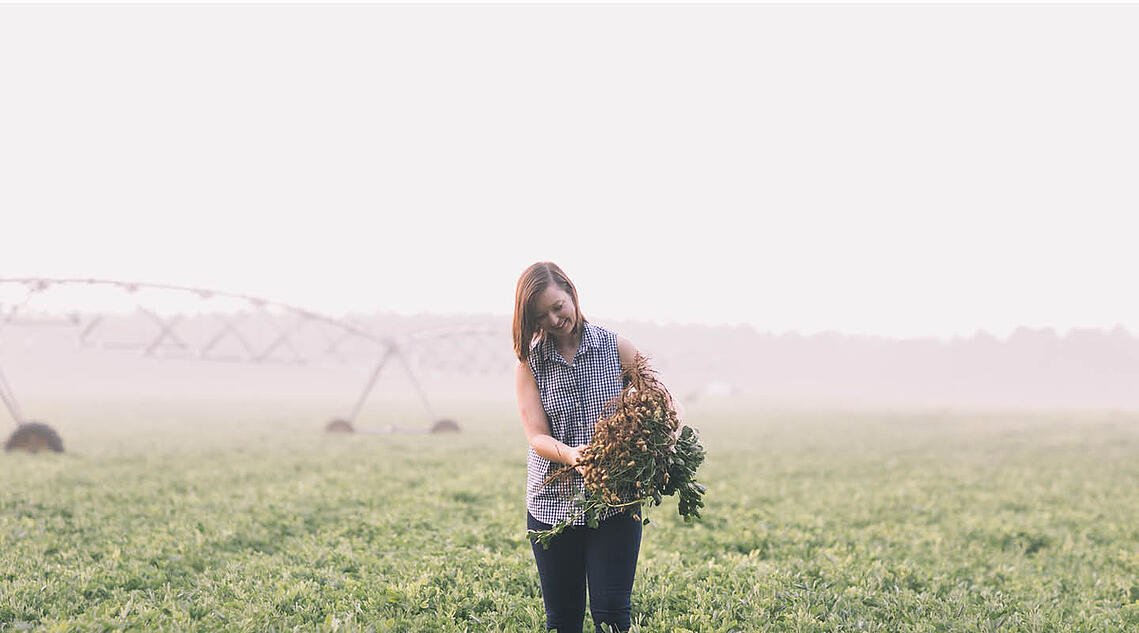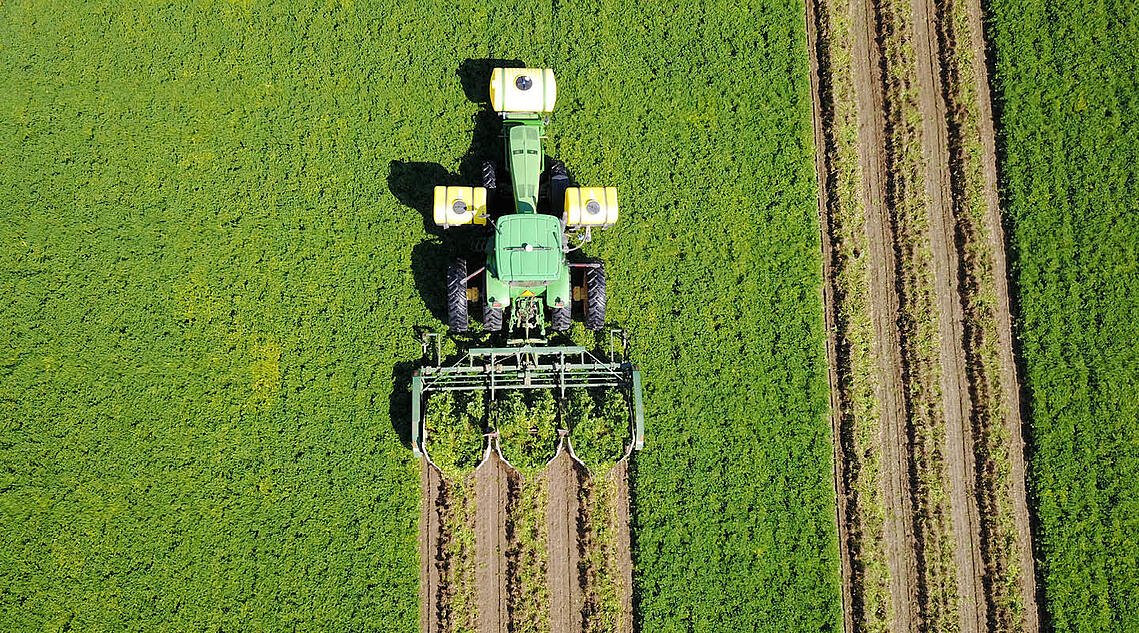Casey Cox is a sixth-generation farmer whose family has been farming the sandy soils along the Flint River in southwest Georgia for more than 150 years. They’ve been growing peanuts for at least three generations, back to Casey’s great-grandfather in the 1920s. In that time, Casey and her family have learned that peanuts are a crop with unique challenges that center pivot irrigation can help overcome.

Casey and Glenn Cox irrigate their peanut crop with Valley® center pivots. Photo Copyright National Peanut Board.
Casey and her father, Glenn, also grow sweet corn, field corn, soybeans, and timber, but peanuts are an institution in Georgia. “They’re the foundation of our local economy and culture,” Casey says.
The Coxes are new members of a grower-owned peanut business, American Peanut Growers Group. “Peanuts have broad market appeal,” Casey says. “Our peanuts are sold for a variety of uses, including snack food items, peanut oil and peanut butter.”
Peanuts are legumes that grow underground, unlike peas or green beans, which grow above the ground. With a long growing cycle of approximately 140 days, they thrive in the southwest Georgia climate. Casey, whose degree is in Forest Resources and Conservation, says, “Peanuts are an excellent rotation crop, enriching the soil through nitrogen fixation, and they are also extremely efficient as it relates to water use, which is important to me.”

Peanuts grow underground, so managing soil conditions is important. Pivots provide the right amount of water at the right time. Photo Copyright Georgia Department of Agriculture.
Like every crop, peanuts face certain challenges during the growing season related to weather, disease and pests. “Because they grow and develop underground, we have to manage conditions in the soil carefully to ensure optimal development,” Casey says. “Our weather is highly variable, so pivot irrigation is a very effective risk management tool to provide the right amount of water at the right time when we don’t receive rainfall during critical growth stages, such as the peak fruiting stage. We receive approximately 52 inches of rain per year in Georgia, but not always the right amount at the right time. Irrigating peanuts drastically enhances the quality of the crop and the yield potential.
“Irrigation may be the difference between making a profit and having a total crop failure.”
Pivot Irrigation Protects Against Risk
The University of Georgia (UGA) has conducted some compelling studies at the C.M. Stripling Irrigation Research Park in Camilla, which is close to the Cox operation, Longleaf Ridge Farms. The benefits of pivot irrigation are especially striking in drought years, Casey explains.
“They estimate peanuts require about 22-24 inches of water during the growing season. One example from 2014, when our area only received about 12 inches of rainfall during the growing season, stands out in my mind. The results of a study conducted that year compared several different types of irrigation scheduling in peanuts, as well as a dryland field for comparison,” Casey says. “The yields for the irrigated peanut fields ranged from 5,500-6,500 pounds/acre, and the yield for the dryland field was only about 400 pounds/acre. Farmers that did not irrigate that year suffered extensively from the drought conditions.”

As a millennial female returning to take over the family farm, Casey Cox hopes to blaze a trail for other young women to pursue a future in ag. Photo Copyright National Peanut Board.
The Coxes use six Valley center pivots in their operation, which they control with AgSense® remote management solutions. “Technology is an important aspect of our farm, especially smart irrigation tools and practices, and AgSense is one of our favorite technologies we use on the farm,” Casey says. “Remote management has significantly increased our ability to optimize irrigation and saved us a tremendous amount of time and fuel.” In addition, they use Valley VRI on one pivot, which helps them be more accurate and efficient when applying water to their sandy soil.
With her passion for conservation, Casey says the Valley products they use align with their goals of irrigation efficiency and optimization of technology. “Pivot irrigation also plays a critical role in the quality and food safety of peanuts we produce,” she adds.
Valley Dealers: The Highest Standards of Service
Casey and Glenn work with Rentz Irrigation, a Valley dealer in Bainbridge, GA. “They provide excellent customer service,” Casey says. “With any type of farm machinery, especially large and complex systems like center pivots, we need technical support to ensure continued operation. Rentz has always been quick to provide the maintenance and support we need, and they understand how critical timing can be.”
After Hurricane Michael last year, the Coxes lost one of their largest center pivot systems. “I was convinced we would not be able to install a new one in time to plant corn in March, given how many systems were down across southwest Georgia,” Casey says. “Rentz had our new system installed and ready to go in plenty of time, which was a huge relief with the additional repairs and recovery efforts we were managing.”

Studies show center pivot irrigation makes a big difference in peanut yields compared to dryland production - sometimes thousands of pounds per acre. Photo Copyright Casey Cox.
Grateful to Learn
Casey says she is grateful to be the sixth generation of her family to farm. Since deciding to return after college and after leading the Flint River Soil and Water Conservation District for six years, she is currently in “a learning stage” with her father on the farm. “He is sharing his knowledge and experiences with me as we begin our transition. I currently co-manage our business operations, finances, technology, and timber strategy.”
She is also actively involved in state and community organizations, where she advocates for agriculture throughout her region and state on behalf of their farm.
To learn more about Casey and her story – including her recent appearance on Sesame Street, click here.
To learn more about how Valley center pivots and remote technology solutions can help you efficiently irrigate your specialty crops, contact your local Valley dealer.